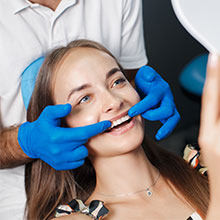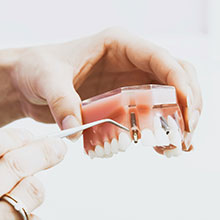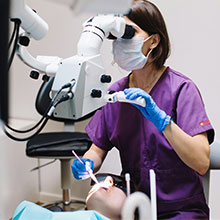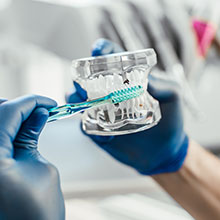Dental Hygiene Treatments
LOOKING AFTER YOUR TEETH WITH HYGIENE APPOINTMENTS
Brushing your teeth at home is really important, but visiting the dentist and hygienist regularly helps keep your mouth extra healthy. They can check for problems and fix them before they get worse, making sure your smile stays bright and healthy.
Healthy Gums for a Healthy Smile
Your gums are just as important as your teeth. If they aren’t looked after properly, gum disease can develop, which can lead to losing teeth. Keeping your mouth clean and free from bacteria helps stop this from happening.
Brushing your teeth and cleaning between them with floss or interdental brushes helps remove harmful plaque and tartar. But some areas are hard to clean by yourself. A hygienist can give your whole mouth a deep clean, making sure your gums stay strong and healthy.
What is Gum Disease?
Eating sugary foods can lead to a sticky layer of plaque forming on your teeth. If this isn’t cleaned properly, bacteria grow, and your gums can get sore and swollen. This is called gingivitis, and it can be treated by removing the plaque and bacteria through good cleaning.
If gingivitis is ignored, it can turn into a more serious condition called periodontitis, which can damage the gums and bones that hold your teeth in place. This stage of gum disease can’t be cured, but it can be controlled with regular treatment from a dental hygienist or gum specialist.
Since gum disease is hard to spot on your own, it’s best to see a hygienist regularly. They can check for any early signs and help stop it from getting worse.
What Happens During a Dental Hygiene Appointment?
Most of the appointment is spent giving your teeth a deep clean, called a scale and polish. This involves:
- A strong jet of water to loosen stubborn tartar.
- Special tools to gently remove tartar from the teeth.
- A polish with a fine gritty paste, leaving your teeth smooth and shiny.
The dental hygienist will also give you tips on how to keep your teeth and gums clean at home. They will show you the best way to brush, floss, and use interdental brushes to keep your smile fresh and healthy.
If your gums need extra care due to advanced gum disease, the dental hygienist can do a deeper clean to remove bacteria from below the gum line. They will explain the best treatment for you and help keep your gums in the best condition possible.




